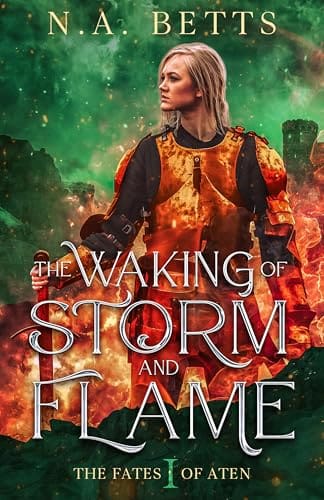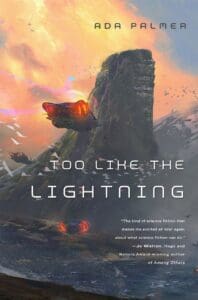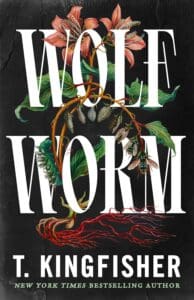
Summary:
A DESTINY SHE NEVER CHOSE. A FATE, SHE CAN’T ESCAPE.
Alira Verbrandt, the Princess of Namelle, savored the scholastic tranquility of her life until the Illyrian Empire descended from the north. On the eve of battle, Alira is drawn into the center of a war that has raged for a thousand years.
Unveiled as a Fate, the descendant of a legendary bloodline, destiny is thrust upon her. Alira must navigate her mortal obligation of defending her people from an empire who means to destroy them, while finding others like her to awaken a rebellious god that may be her last hope..
At the heart of her worry, an ancient record foretells the return of their creator. He who shall pass a final judgment over both humanity and the gods, one they may not survive.
Review:
Looking for some classic-style fantasy but with a modern slant? Then make sure to check out The Waking of Storm and Flame, as it has all the trappings of classic fantasy: chosen ones (The Fates of Aten), meddling gods (who actually walk amongst mortals), magical implements (a nice ring), and heroes getting betrayed. So yeah, perfectly classic fantasy!
When a neighboring land invades, royal Steward of Gondor, I mean Duke Cael Verbrandt raises his army under the leadership of his adoptive sister, Commander Zahra Ke’elle, as well as his younger sister, Alira, and marches to the dwarven lines in hopes of stopping the invasion. Cael is declared King, they’re attacked and overwhelmed. Some things happen, and voila, the siblings are separated and we spend the rest of the novel trying to get back together and save their homeland.
The characters are really what drives this novel, specifically Alira and Zahra, who you could argue are the two main characters. Both are as different as can be. Alira is a bookish young woman who has never been outside their city, has never witnessed battle, nor has she really seen anything outside of her imagination and history books. While Zahra, on the other hand, was trained by their country’s famous general, has become a warrior of renown (she’s one of the few people to kill a very gnarly beastie type guided by the aforementioned meddling gods), and has a mysterious past. Both women are fantastic and trope-filled. Their arcs follow a similar trajectory toward self-discovery and I enjoyed them both equally, although Alira did at times grate on me like a younger sibling should. Cael is your standard fare royal warrior with some baggage, aka feelings of inadequacy. The general and the other side characters have some nice bits to them, but many just move the plot along when needed.
I will say my favorite aspect of TWoSaF are the meddling gods and magic system. There are a few layers to them as there are gods, then there are the Fates of Aten (one of the gods). And on top of that, the gods are at war with each other over reasons. I don’t want to spoil anything there, but I really did enjoy how the gods manifested themselves on the characters via those magical implements. The main implement in this book is the Ring of Terra, and is an earth-based magic weapon of the goddess Drea. And when invoked, Drea actually takes over the user for a time, thus creating some great tension when said character wants to regain control. Another magical weapon (this time a sword the Verbrandts’ father carried into battle) is found, and based on where Alira’s arc ends, the rest of the series will be spent finding the rest of Aten’s Fates/weapons. Another really cool magical tidbit is the sheyde, a shadow being-esque thing that has afflicted Zahra after her battle with the beastie. It’s almost like a possession, and toward the end, it plays a role in Zahra’s arc. This was really neat.
This story is very battle heavy and military forward (based on Betts’ own military background). The entire first half of the book is essentially one big battle. Then when the siblings split up post battle, we have some scenes of politicking to muster more soldiers, then we climax with another huge battle. I will say the battles were great and I loved the accurate chain of command, but there were times I felt discombobulated and didn’t exactly know where I was settings-wise, as well as timeline-wise. Things did kinda blend together because a lot of what happens during the battles were told to the characters via messengers like how actual commanders would have. Until they take the field of battle, which Cael, Zahra, and Alira do often.
The prose teeters on the line of classic fantasy ala Tolkien and a tad modern. I’d say the pace of the story was up and down accordingly due to the battles mentioned above versus the more political side. As a personal taste, I do feel like the economy of setting was not as strong as I would like, meaning I didn’t feel very immersed in the scenes, especially the battles. However, I do feel as there were great emotional beats throughout the story, certain twists were clear as day but the consequences were nice and hit when needed. My biggest gripe, as with most classic SFF books, is the use of third person omniscient POV. I’m just not a fan of head hopping. There were a number of times where the POV wasn’t clear for paragraphs or a ‘she’ was used to describe the character in the scene and it wasn’t clear who ‘she’ was. Again, small things that didn’t take away from my enjoyment of this story.
The Waking of Storm and Flame is definitely a love letter to the type of fantasy stories I grew up reading, and I can honestly say I had a fun time with this story. It doesn’t break a ton of new ground but it doesn’t need to. I was fully engaged with Betts’ story and I can’t wait to see what he has in store for these characters in his upcoming sequel, The Last Cry of Innocence, which comes out on May 14th!






Leave a Reply